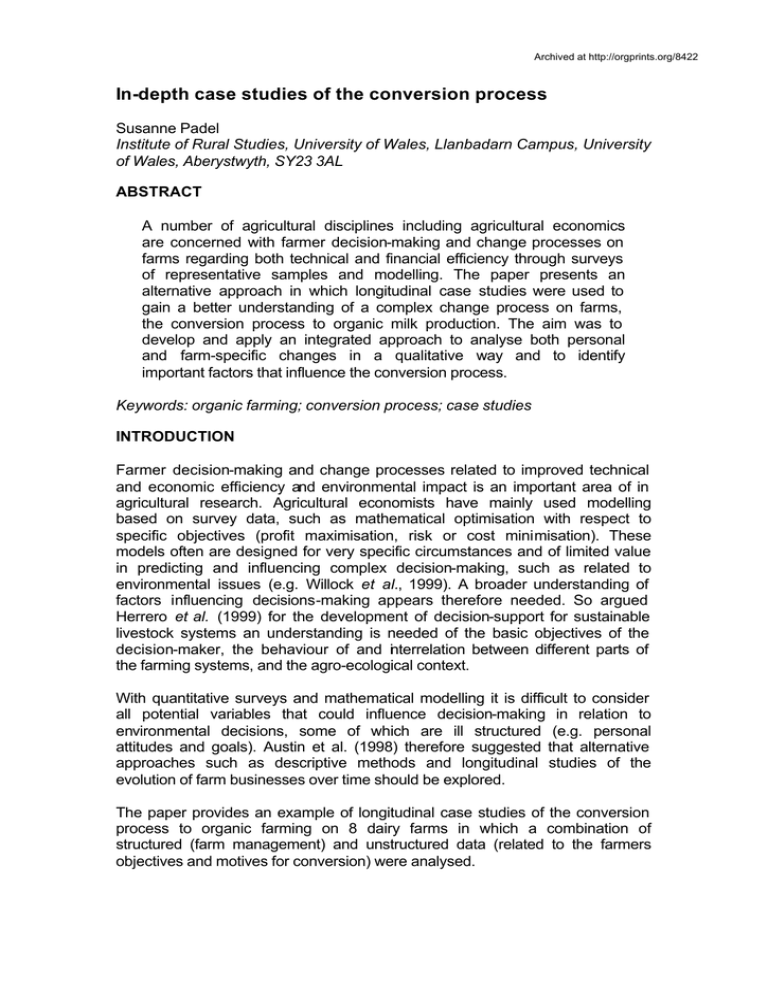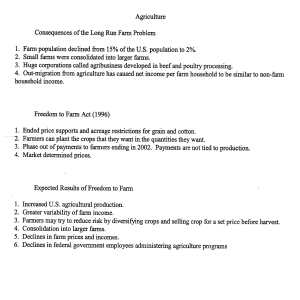Organic Milk Conversion: In-Depth Case Studies
advertisement

Archived at http://orgprints.org/8422 In-depth case studies of the conversion process Susanne Padel Institute of Rural Studies, University of Wales, Llanbadarn Campus, University of Wales, Aberystwyth, SY23 3AL ABSTRACT A number of agricultural disciplines including agricultural economics are concerned with farmer decision-making and change processes on farms regarding both technical and financial efficiency through surveys of representative samples and modelling. The paper presents an alternative approach in which longitudinal case studies were used to gain a better understanding of a complex change process on farms, the conversion process to organic milk production. The aim was to develop and apply an integrated approach to analyse both personal and farm-specific changes in a qualitative way and to identify important factors that influence the conversion process. Keywords: organic farming; conversion process; case studies INTRODUCTION Farmer decision-making and change processes related to improved technical and economic efficiency and environmental impact is an important area of in agricultural research. Agricultural economists have mainly used modelling based on survey data, such as mathematical optimisation with respect to specific objectives (profit maximisation, risk or cost minimisation). These models often are designed for very specific circumstances and of limited value in predicting and influencing complex decision-making, such as related to environmental issues (e.g. Willock et al., 1999). A broader understanding of factors influencing decisions-making appears therefore needed. So argued Herrero et al. (1999) for the development of decision-support for sustainable livestock systems an understanding is needed of the basic objectives of the decision-maker, the behaviour of and interrelation between different parts of the farming systems, and the agro-ecological context. With quantitative surveys and mathematical modelling it is difficult to consider all potential variables that could influence decision-making in relation to environmental decisions, some of which are ill structured (e.g. personal attitudes and goals). Austin et al. (1998) therefore suggested that alternative approaches such as descriptive methods and longitudinal studies of the evolution of farm businesses over time should be explored. The paper provides an example of longitudinal case studies of the conversion process to organic farming on 8 dairy farms in which a combination of structured (farm management) and unstructured data (related to the farmers objectives and motives for conversion) were analysed. Archived at http://orgprints.org/8422 APPROACH In developing the specific approach reference was made to the use of case studies in Farming Systems Research (Bawden, 1995; Maxwell, 1986), and qualitative social and case study research (e.g. Lofland and Lofland, 1984; Yin, 1994). The conversion process of each farm was investigated both in relation to the farmer and to the farm. Intensive interviews with the farmers—carried out in 1995—were related to motives and objectives, personal experiences and problems during the conversion process. These were analysed with the help of a computer program for indexing and retrieval of unstructured data. Data from accounts covered farm structure, production and farm income indicators. Each farm was compared against its pre-conversion situation, and with other case study farms. Conventional comparison data helped assessing the hypothetical situation of production and income levels under uninterrupted conventional management. As in other case studies of environmental change process on farms (e.g. Gafsi, 1999) the analysis considered a variety of perspectives, such as the conceptual boundaries and the outcome of the process. Personal and farm related data were contrasted for each case study farm in a qualitative way. RESULTS AND DISCUSSION The mixed and specialist dairy case study farms in England and Wales converted to organic farming before 1992 (Haggar and Padel, 1996). Their motives appeared to be similar to those in 'later' European studies of organic producers (e. g. Maurer, 1997) with a strong emphasis on environmental and financial reasons, whereas technical ones were less frequently mentioned. The difference to results by Burton et al., (1999) who found strong impact of lifestyle may be related to the farming background of most of these dairy farmers. A number of variables likely to influence the conversion decision that had been identified from the literature were confirmed in three domains: • External factors, e.g. the likely availability of a premium for organic milk; • Farm-specific circumstances, e.g. the taking over of the farm or problems with animal health; • Personal circumstances: e.g. relationship with neighbours; personal health, growing confidence. The perception of a change in external circumstances (likely organic premium) was a very important trigger of the conversion-decision for the majority of the case study farmers coinciding with changes in personal attitudes or of farm circumstances. The conversion experience appeared also to influence the farmers’ personal attitudes later on. The data from the case study farms confirmed the importance of price premiums for decision-making and financial success, but the level of premium Archived at http://orgprints.org/8422 was not found to be an explanatory factor for variation in dairy gross margins. Only one farmer developed direct marketing although this had been a motive for the conversion on several farms, but improvement of the marketing was an important objective to several farmers. As one possible reasons for raising labour requirements and costs (approximately 20% higher than on comparable conventional farms ( Franks, 1999) some farmers mentioned preventive health management. The combination of personal, physical and financial data allowed a broad assessment of the impact of the change process on the farming systems. At the time of interview (3 to 7 years after conversion) the objectives for the running the farms were related to lifestyle and family-related goals, the financial situation, diversification and technical aspects of production, several of which appeared to have an impact on decision-making. Comparing key objectives with farm indicators four broad orientations (similar to farming styles) were identified: Production and Marketing; Diversification and Marketing; Diversification and Low Cost Production; and Low Cost Production and Lifestyle. A cross-case comparison of gross margins under organic management identified milk yields per cow, use and costs of concentrates, forage production and utilisation, and other dairy expenses as potentially important profitability factors. The level of the conversion costs (actual income compared with hypothetical conventional) was further influenced by structural changes, pre-conversion intensity and conversion strategy, the choice of which was found to be related to the farmers’ decision-making process regarding the conversion. CONCLUSIONS Case study research is a suitable method to analyse systems’ change processes on farms, such as the conversion to organic farming. On a small number of farms the variables influencing the decision-making processes can be considered alongside the impact on the farm and the interactions in a qualitative way. This is particularly relevant in areas where the farmers’ conceptualisation of a problem is not known in advance. Data on the personal context of the farmers’ motivations and personal objectives had explanatory value for the farm development, but contrasting different types of data remained the most difficult part of the analysis. Such research can supplement larger surveys of farms through the in-depth knowledge and improved understanding of important factors that drive change processes but cannot replace them. ACKNOWLEDGEMENTS Thanks to all case study farmers, MAFF (now DEFRA) for financial support and many colleagues for their critical support. Archived at http://orgprints.org/8422 REFERENCES Austin, E. J., J. Willock, I. J. Deary, G. J. Gibson, J. B. Dent, G. E. Jones, O. Morgan, R. Grieve and A. Sutherland (1998) Empirical models of Farmer Behaviour using psychological, social and economic variables. Part II: Non-linear and Expert Modelling. Agricultural Systems 58 (2), 225-241. Bawden, R. (1995) On the systems dimension in FSR. Journal for Farming Systems Research and Extension 5 (2), 1-18. Burton, M., D. Rigby and T. Young (1999) Analysis of the determinants of adoption of organic horticulture techniques in the UK. Journal of Agricultural Economics 50 (1), 48-63. Franks, J. (1999) Dairy Enterprise Costs Study: A review of the structure and economics of milk production 1987/88 to 1996/97. Special Studies in Agricultural Economics, No. 45, Farm Business Unit, Manchester University. Manchester. Gafsi, M. (1999) A management approach to change on farms. Agricultural Systems 61 (1999), 179-189. Haggar, R. and S. Padel (ed.) (1996) Conversion to organic milk production. Technical Review No 4, IGER; Aberystwyth. Herrero, M., R. H. Fawcett and J. B. Dent (1999) Bio-economic evaluation of dairy farm management scenarios using integrated simulation and multiple-criteria models. Agricultural Systems 62 (1999), 169-188. Lofland, J. and L. H. Lofland (1984) Analysing Social Settings. Wadsworth Publishing Company; Belmont, California. Maurer, J. (1997) Umstellung auf Biolandbau in der Schweiz- Motivation und Hemmnisse. In: Beitrage zur 4. Wissenschaftstagung zum ökologischen Landbau, 3 - 4 March 1997, Bonn. (U. Köpke and J. A. Eisele). Verlag Dr. Köster; Berlin, pp 523-529. Maxwell, S. (1986) The role of case studies in farm systems research. Agricultural Administration 21 147-180. Willock, J., I. A. Deary, G. Edwards-Jones, G. J. Gibson, M. J. McGregor, A. Sutherland, J. B. Dent, O. Morgan and R. Grieve (1999) The role of attitudes and objectives in farmer decision making: Business and environmentally-oriented behaviour in Scotland. Agricultural Economics 50 (2), 286-303. Yin, R. K. (1994) Case study research: design and methods,. Applied Social Research Method Series Vol. 5, London; Sage Publications. From: Powell et al. (eds), UK Organic Research 2002: Proceedings of the COR th Conference, 26-28 March 2002, Aberystwyth, pp. 289-292.
